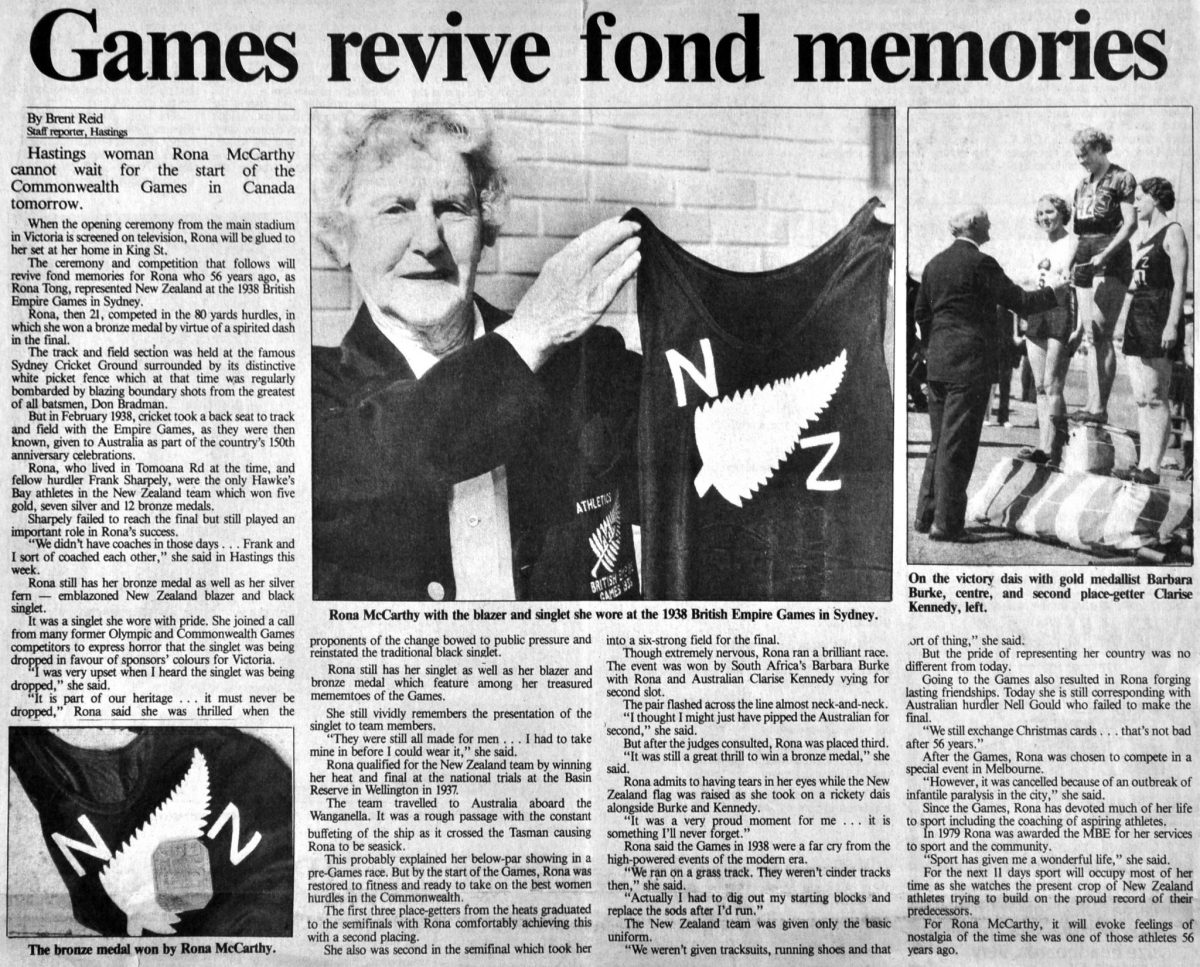Games revive fond memories
By Brent Reid
Staff reporter, Hastings.
Hastings woman Rona McCarthy cannot wait for the start of the Commonwealth Games in Canada tomorrow.
When the opening ceremony from the main stadium in Victoria is screened on television, Rona will be glued to her set at her home in King St.
The ceremony and competition that follows will revive fond memories for Rona who 56 years ago, as Rona Tong, represented New Zealand at the 1938 British Empire Games in Sydney.
Rona, then 21, competed in the 80 yards hurdles, in which she won a bronze medal by virtue of a spirited dash in the final.
The track and field section was held at the famous Sydney Cricket Ground surrounded by its distinctive white picket fence which at the time was regularly bombarded by blazing boundary shots from the greatest of all batsmen, Don Bradman.
But in February 1938, cricket took a back seat to track and field with the Empire Games, as they were then known, given to Australia as part of the country’s 150th anniversary celebrations.
Rona, who lived in Tomoana Rd at the time, and fellow hurdler Frank Sharpely, [Sharpley] were the only Hawke’s Bay athletes in the New Zealand team which won five gold, seven silver and twelve bronze medals.
Sharpely failed to reach the final but still played an important role in Rona’s success.
“We didn’t have coaches in those days … Frank and I sort of coached each other,” she said in Hastings this week.
Rona still has her bronze medal as well as her silver fern – emblazoned New Zealand blazer and black singlet.
It was a singlet she wore with pride. She joined a call from many former Olympic and Commonwealth Games competitors to express horror that the singlet was being dropped in favour of sponsors’ colours for Victoria.
“I was very upset when I heard the singlet was being dropped,” she said.
“It is part of our heritage … it must never be dropped,” Rona said she was thrilled when the proponents of the change bowed to public pressure and reinstated the traditional black singlet.
Rona still has her singlet as well as her blazer and bronze medal which feature among her treasured mementoes [mementos] of the Games.
She still vividly remembers the presentation of the singlet to team members.
“They were still all made for men … I had to take mine in before I could wear it,” she said.
Rona qualified for the New Zealand team by winning her heat and final at the national trials at the Basin Reserve in Wellington in 1937.
The team travelled to Australia aboard the Wanganella. It was a rough passage with the constant buffeting of the ship as it crossed the Tasman causing Rona to be seasick.
This probably explained her below par showing in a pre-Games race. But by the start of the Games, Rona was restored to fitness and ready to take on the best women hurdles in the Commonwealth.
The first three place-getters from the heats graduated to the semi-finals with Rona comfortably achieving this with a second placing.
She also was second in the semi-final which took her into a six-strong field for the final.
Though extremely nervous, Rona ran a brilliant race. The event was won by South Africa’s Barbara Burke with Rona and Australian Clarise Kennedy vying for second slot.
The pair flashed across the line almost neck-and-neck.
“I though I might just have pipped the Australian for second,” she said.
But after the judges consulted, Rona was placed third.
“It was still a great thrill to win a bronze medal,” she said.
Rona admits to having tears in her eyes while the New Zealand flag was raised as she took on a rickety dais alongside Burke and Kennedy.
“It was a very proud moment for me … it is something I will never forget.”
Rona said the Games in 1938 were a far cry from the high-powered events of the modern era.
“We ran on a grass track. They weren’t cinder tracks then,” she said.
“Actually, I had to dig out my starting blocks and replace the sods after I’d run.”
The New Zealand team was given only basic uniform.
“We weren’t given tracksuits, running shoes and that sort of thing,” she said.
But the pride of representing her country was no different from today.
Going to the Games also resulted in Rona forging lasting friendships. Today she is still corresponding with Australian hurdler Nell Gould who failed to make the final.
“We still exchange Christmas cards… that’s not bad after 56 years.”
After the Games, Rona was chosen to compete in a special event in Melbourne.
“However, it was cancelled because of an outbreak of infantile paralysis in the city,” she said.
Since the Games, Rona has devoted much of the life to sport including the coaching of aspiring athletes.
In 1979 Rona was awarded the MBE for her services to sport and the community.
“Sport has given me a wonderful life,” she said.
For the next 11 days sport will occupy most of her time as she watches the present crop of New Zealand athletes trying to build on the proud record of their predecessors.
For Rona McCarthy, it will evoke feelings of nostalgia of the time she was one of those athletes 56 years ago.
Photo captions –
Rona McCarthy with the blazer and singlet she wore at the 1938 British Empire Games in Sydney.
On the victory dais with gold medalist Barbara Burke, centre and second place-getter Clarise Kennedy, left.
The bronze medal won by Rona McCarthy.












Do you know something about this record?
Please note we cannot verify the accuracy of any information posted by the community.